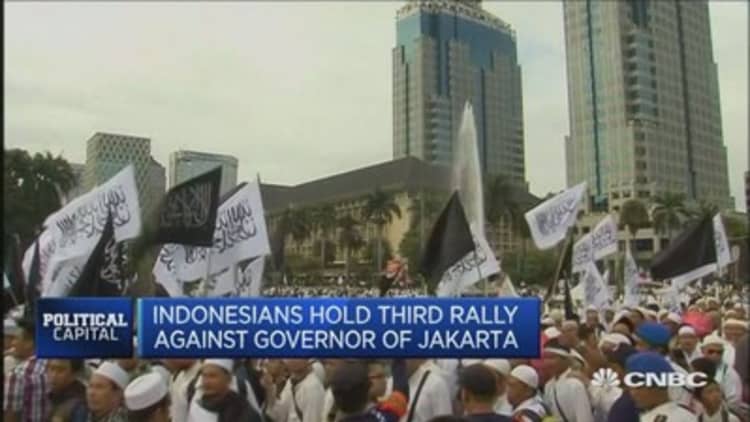A series of highly-charged protests over an Indonesian Christian politician reflects the extent of the ideological battle gripping Southeast Asia's largest economy
There are now fears that the growing religious unrest, mixed with political tensions, could distract Indonesia's leadership from much-needed reforms.
Rally and counter-rally
A Christian of Chinese ethnicity in the world's largest Muslim-majority nation, Jakarta Governor Basuki Tjahaja Purnama—known as Ahok—was accused of insulting Islam after he cited a Koranic verse that suggests Muslims should not take Jews or Christian as allies or leaders in a September 27 speech.
Ahok, who is running to keep his seat in February's gubernatorial elections, said Indonesians should not be deceived by people who used the verse to influence the election. Despite apologizing, the politician is being investigated by police and now faces potential charges of blasphemy amid national unrest.
On Oct. 14, thousands marched in Jakarta, demanding legal action against the governor. Similar protests followed in other cities, including Surabaya and Bandung. On Nov. 4, a 50,000-strong demonstration resulted in clashes with police that injured more than 100 people and left one dead. On Dec. 2, around 200,000 protested, urging for Ahok's ejection from office.
Shaken by the religious divide, more than 10,000 people held a counter-rally on Nov. 21, calling for tolerance. A second unity demonstration was held on Dec. 4, with around 30,000 in attendance.
A deeper divide
Indonesia is known for its moderate brand of Islam. The country's largest Muslim organizations—Nahdlatul Ulama and Muhammadiyah—do not support the anti-Ahok rallies and have urged Muslims to remain calm.
But hardline groups such as the Islamic Defenders Front (FDI), organizers of the anti-Ahok protests, are widespread. The FDI, who calls for a formal adoption of sharia law, follows a specific interpretation of Sunni Islam that labels non-Muslims "infidels" and has been implicated in violent attacks against minority religions, according to Human Rights Watch.
The FDI's teachings challenge a key philosophy that has governed Indonesia since 1985: Pancasila, a secular principle based on the idea of national unity and a belief in one god, the identity of whom is left open to individual interpretation.
The debate about the role of Islam in a secular state, combined with the growing strength of radical entities like the FDI, are the key themes underpinning national anger towards Ahok, Dina Afrianty, research fellow at Australian Catholic University, told CNBC.

"We're dealing with implications of a long-term rise in conservatism," Douglas Ramage, managing director at consulting firm Bower Group Asia, agreed.
And there is the additional risk that the FDI-led protests could provide a fresh opportunity for global terror network Islamic State to expand its membership in Indonesia by capitalizing on the conservative fervor.
Religious politics or just politics?
Adding to the explosive situation is a theory that Islam isn't actually at the heart of the political unrest.
"Rumors are circulating in Jakarta that former president Susilo Bambang Yudhoyono is actually the source of funding behind these protests," said Afrianty. That line of thinking had led moderate Indonesians to believe the protests had more to do with politics than Islam, she continued.
The rumor emerged last month after President Joko Widodo, or Jokowi, said "political actors" were exploiting the situation. Yudhoyono's family has vehemently denied involvement in the protests.
Regardless of the motive, the protests and influence of fundamentalist groups could hurt Jokowi's administration.
"This makes the job of Jokowi and other reformers, such as Ahok, much harder. For Islamists, Jokowi is seen as a secular nationalist leader who doesn't represent their Islamic identity so they want to vote him out," Afrianty said.
Before Friday's protest in Jakarta, Indonesian police said they had foiled a plot to use the protests to lead an uprising against Jokowi, Reuters reported. Police detained 10 people in the early hours of Friday, including politician Rachmawati Sukarnoputri, who is the sister of former president Megawati Sukarnoputri, as well as musician Ahmad Dhani and retired army general Kivlan Zen, Reuters said.
"The on-going political tension between religion and politics is distracting Jokowi from his main priorities, which is improving infrastructure and regulatory burden on investors," Ramage stated.
The situation could hit the economy, too, at a time when investors have praised Indonesia as a standout opportunity among emerging markets.
"Indonesia is one of numerous competitive emerging markets competing for limited investment dollars, so this becomes one more thing that investors put in the negative column if they believe political stability is under threat," Ramage warned.


